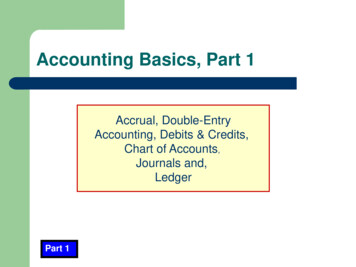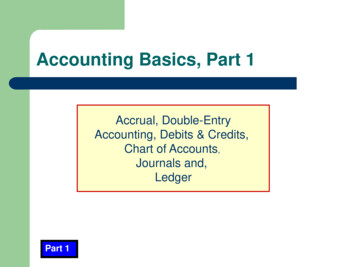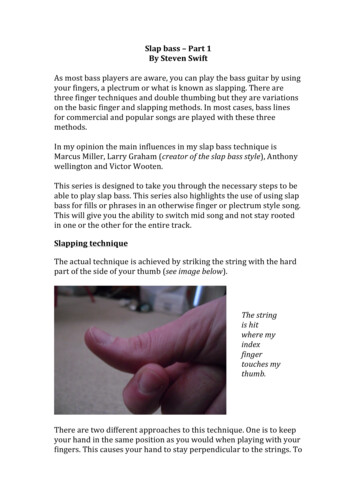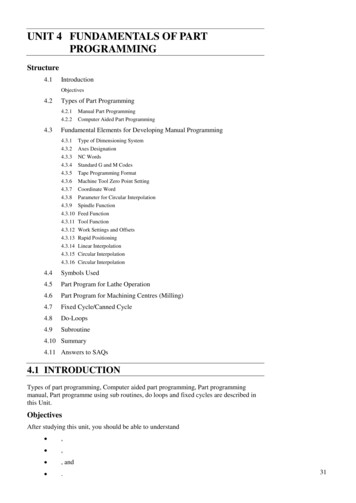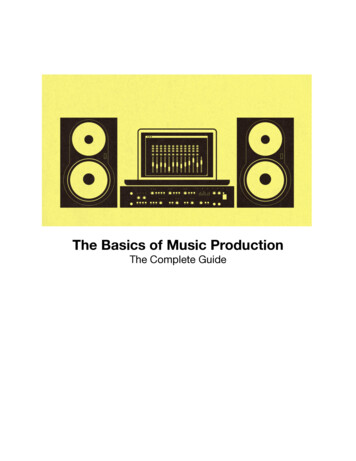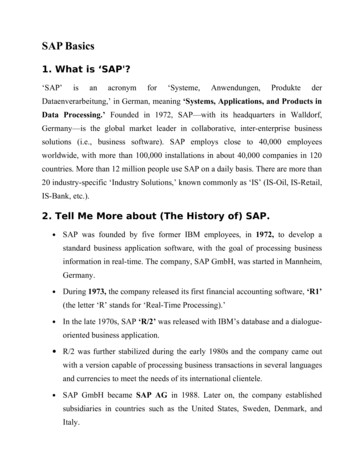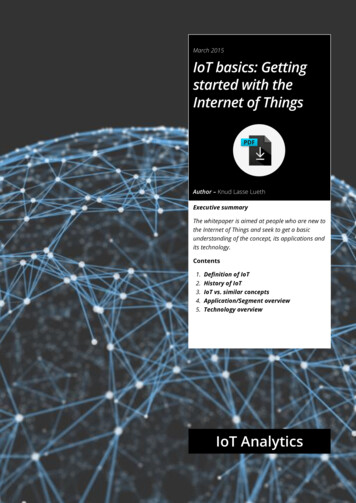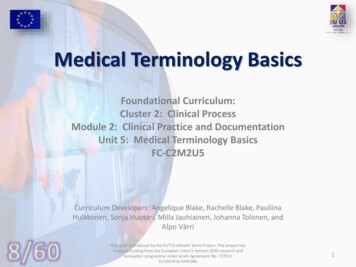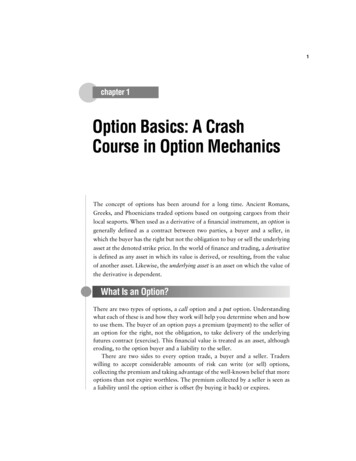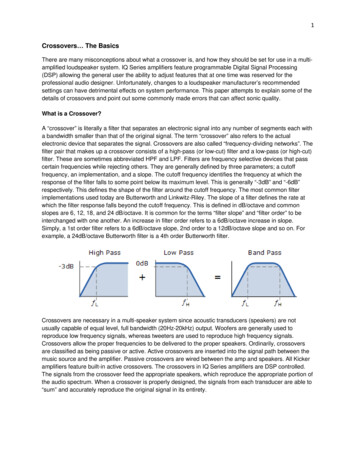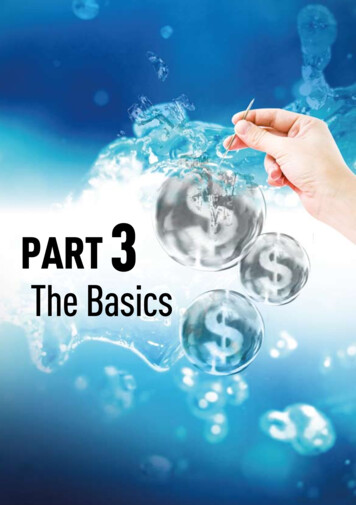
Transcription
PART 3The Basics10
PART 3 The BasicsA.What is Money Laundering?3.1Put simply, “money laundering” covers all kinds of methodsused to change the identity of illegally obtained money (i.e.crime proceeds) so that it appears to have originated from alegitimate source.3.2A money laundering scheme will therefore usually involve acombination of several different techniques and vehicles,which may not necessarily involve the conventional financialsector. Accountants, estate agents, precious metals andprecious stones dealers and trust and company serviceproviders, are all known to have been employed in moneylaundering schemes.3.3While the techniques for laundering funds vary considerablyand are often highly intricate, there are generally three stagesin the process: Placement: involves placing thecrime proceeds in the financialsystem (e.g. depositing cash into abank account, exchange currency ofsmall denominations to currency oflarge denominations); Layering: involves converting theproceeds of crime into anotherform and creating complex layersof financial transactions to disguisethe audit trail and the source andownership of the funds (e.g. buyingprecious metals or stones withcash, buying and selling of stocks,commodities or properties; takingout and repaying a loan); and Integration: involves placing thelaundered proceeds back in theeconomy under a veil of legitimacy.11
123.4These three stages are not distinct. They are very oftenoverlapping with each other and repeated, making tracing ofcrime proceeds and their sources difficult.3.5In Hong Kong, crime proceeds are generated from variousillegal activities. They can be derived from drug trafficking,smuggling, illegal gambling, bookmaking, blackmail,extortion, loan sharking, tax evasion, controlling prostitution,corruption, robbery, theft, fraud, copyright infringement,insider dealing and market manipulation.3.6When crime proceeds are laundered, criminals would thenbe able to use the money without being linked easily to thecriminal activities from which the money was originated.
PART 3 The BasicsB.What is Terrorist Financing?3.7Terrorist financing can be definedin simple terms as the financialsupport, in any form, of terrorismor of those who encourage, plan,or engage in terrorism.Moneylaundering and terrorist financingmanipulations are similar, mostlyhaving to do with concealment anddisguise.3.8Money launderers will send crimeproceeds through legal channels inorder to conceal its criminal origin,whilst terrorist financiers will transferfunds that may be legal or illicit inorigin in such a way as to concealtheir source and ultimate use, whichis the support of terrorism.C.Why is Anti-Money Laundering andCounter-Terrorist Financing Important to you?3.9As one of the major financial centres in the world, it is veryimportant for Hong Kong to maintain an effective anti-moneylaundering (AML) and counter financing of terrorism (CFT)regime, which is vital for maintaining the integrity and stabilityof our financial system. Money laundering and terroristfinancing can have devastating consequences to the wholecommunity. If we do not put in place an effective regime inaccordance with the international standards, we will openthe floodgates to illicit funds and provide a good refuge forcriminals and terrorists. They can then use the illicit fundsto further their illegal activities. We will all suffer as a result ofcriminals or terrorists taking charge of our businesses andeconomic sanctions by the international community, whichwould adversely affect our livelihood.13
143.10Both money laundering and terrorist financing are criminaloffences under the Laws of Hong Kong. According tothe Drug Trafficking (Recovery of Proceeds) Ordinance(Cap.405) and the Organized and Serious CrimesOrdinance (Cap.455), a person commits the offence ofmoney laundering if he deals with any property, includingmoney, which he knows or has reasonable grounds tobelieve to be proceeds of crime. Under the United Nations(Anti-Terrorism Measures) Ordinance (Cap.575), a personcommits the offence of terrorist financing if he provides orcollects funds knowing or with the intention that thefunds will be used to commit terrorist act(s).3.11Taking an indifferent attitude or turning a blind eye to atransaction you know or have reasonable grounds to believethat crime proceeds/terrorist funds are involved, may resultin your conviction for the above offences.
PART 3 The BasicsD.What Do You Need to Do?3.12Anti-money laundering and counter-terrorist financing iseveryone’s responsibility. However, some sectors face agreater risk of coming across crime proceeds or terroristproperty than others, e.g. accountants, estate agents,precious metals and precious stones dealers and trust andcompany service providers, etc.3.13When you come across any property, which you know orsuspect to be drug or crime proceeds or terrorist property,you should make a suspicious transaction report (STR) tothe Joint Financial Intelligence Unit (JFIU).3.14Whilst there is no prescribed manner of reporting, it isadvisable to make STRs in writing. A standard form hasbeen designed to assist individuals in making STRs. Theform can be downloaded from the JFIU website (www.jfiu.gov.hk). A STR should include the following information: Personal particulars and contact details of the individualsor entities involved in the suspicious activity; Details of the suspicious activity; The suspicious activity indicators observed; and Any explanation provided by the subject of the STR whenquestioned about the transaction or activity.15
163.15Failing to report knowledge or suspicion of crime proceedsor terrorist property is a criminal offence. If you go on todeal with such property knowing or having reasonablegrounds to believe that the property is crime proceeds,then you may have committed the offence of moneylaundering.3.16It should be noted that the crime from which the proceedswere derived does not need to have taken place in HongKong, e.g. if you come across certain property in HongKong, which you know or suspect is proceeds of drugtrafficking in an overseas country, you should also reportyour knowledge or suspicion to the JFIU. Again, failure toreport knowledge or suspicion of such property and dealingwith such property are criminal offences.3.17To prevent your sector from exploitation by moneylaunderers and terrorist financiers, and protect yourself fromunwittingly committing the money laundering and terroristfinancing related offences described above, in addition toreporting suspicious transactions, it is advisable that youshould always conduct Customer Due Diligence (CDD),maintain proper records of transactions and have inplace a proper internal control system.3.18Besides reporting suspicious transactions, CDD and recordkeeping are two of the “core” money laundering and terroristfinancing counter-measures adopted by the internationalcommunity and have been implemented in the banking,securities and futures, and insurance sectors in Hong Kongin compliance with the anti-money laundering guidelinesissued by the respective sector regulators.
PART 3 The Basics3.19CDD means “Know Your Customers and their transactions”in general terms, i.e.: know who you are actually dealing with; know the beneficiaries of the transactions; know the purposes and nature of the transactions; and know the sources of the funds involved.3.20The ways of gatheringthis information may varyfrom business to business.For some businesses,the relevant informationabout the clients and thetransactions may havebeen required by applicablelaws or established practices. For others, members ofthe trade may need to do their own checks. In mostcases, asking the customers for the information skillfullywould do, e.g. by tactfully posing questions in the midst ofpromoting products or services that may be of interest to thecustomers.3.21Persons engaged in legitimate business activity, generally,will have no objection to, or hesitation in answering suchquestions. Persons involved in illegal activity, however, aremore likely to be evasive, to refuse to answer or providea fabricated answer. The manner in which a customeranswers such questions may be an indication of thesuspicious nature of the transaction or activity.17
3.22The JFIU has developed a “SAFE” approach to assist you inidentifying suspicious transactions and business activities. Screen the customer and transaction for suspiciousactivity indicators; Ask the customer appropriate questions to clarifysuspicious circumstances; Find out whether the transaction commensurates withwhat is expected from the customer by reviewing theinformation already known about the customer; and Evaluate all the above information and decide whetherthe transaction relating to the customer is genuinelysuspicious.In case of doubt, the JFIU is happy to advise (Tel no.:2866 3366, Fax no.: 2529 4013, Email: jfiu@police.gov.hk).EvaluateFindAskScreen3.2318As for record keeping, many businesses may have thepractice of keeping records of customers and transactionsin accordance with applicable legal requirements,e.g. taxation etc. Record keeping is important to antimoney laundering investigation which allows for swiftreconstruction of individual transactions and providesevidence for prosecution of criminal activities includingmoney laundering.
PART 3 The Basics3.24In order to prevent money laundering and terrorist financing,it is important that businesses in various sectors shouldestablish and maintain internal policies, procedures andcontrols. These policies, procedures and controls, whichmust be communicated to employees, should cover CDD,record keeping and suspicious transaction reporting.3.25At a minimum, businesses should designate an AML/CFT compliance officer at the management level,whose responsibilities should include overseeing theimplementation of the above-mentioned internal policies,procedures and controls. To this end, the compliance officerand other appropriate staff should have timely access toinformation/data obtained in the CDD process, transactionrecords and other relevant information.3.26Independent audits should be carried out to test compliancewith the internal policies, procedures and controls.3.27Induction and on-going employee training programmesshould be introduced in order to establish and maintainemployees’ vigilance in AML/CFT matters, in particular,CDD, record keeping and suspicious transaction reporting.3.28Business should put in place screening procedures toensure high standards in the recruitment process.19
3.29Though CDD, record keeping, suspicious transactionreporting and internal controls have been practiced in ourbanking, securities and insurance sectors for years, they arecertainly new to your sectors and may present challengesto you.Apart from possible resource implications,management commitment, capacity building and culturechange in your sectors and amongst your customers maybe required. It may take some time to incorporate thesemeasures in your daily practice. Most important of all is tostart practicing them now: Customer Due Diligence Record Keeping Suspicious Transaction Reporting Internal Control20
PART 3 The BasicsE.The Role of the Narcotics Division andthe Joint Financial Intelligence Unit3.30The Financial Services and the Treasury Bureau (FSTB)is the overall co-ordinator for anti-money launderingand counter-terrorist financing policy in Hong Kong. Itmonitors the compliance of various sectors with the 40 9Recommendations made by the Financial Action Task Forceon Money Laundering (FATF).3.31The Narcotics Division (ND) of Security Bureau assists FSTBin overseeing the implementation of those FATFRecommendations that are related to the non-financialsectors and the non-profit organisations with a view toensuring that the anti-money laundering/counter-terroristfinancing measures taken by those sectors andorganisations are in step with the established internationalstandards. For more details of ND, please visit ND’s website(www.nd.gov.hk).3.32The Joint Financial Intelligence Unit (JFIU) is jointly operatedby the Police and the Customs and Excise Department. It ishoused in the Police Headquarters. It was set up in 1989 toreceive, analyse and disseminate STRs to four lawenforcement agencies in Hong Kong, namely, the Police,the Customs and Excise Department, the IndependentCommission Against Corruption and the ImmigrationDepartment, for investigation. Further details about the unitcan be found at its website (www.jfiu.gov.hk).21
A. What is Money Laundering? 3.1 Put simply, “money laundering” covers all kinds of methods used to change the identity of illegally obtained money (i.e. crime proceeds) so that it appears to have originated from a legitimate source. 3.2 A money laundering scheme will therefore usually involve a
